Gigi Goes to Ben & Jerry's Week Intro
Gigi Goes to Ben & Jerry's Part 1
Gigi Goes to Ben & Jerry's Part Deux!
Gigi, Ben & Jerry Jerry à Trois
Gigi, Ben, Jerry, and a Trio of Gurus: The Saga IV
So, the question remains: How did two happy hippies who loved the company they gave life to end up selling out to The Man?
As with most stories, sometimes you have to go back to the very beginning.
Ben Cohen and Jerry Greenfield met as kids while students at the same middle school in Merrick, New York. Like all best friends, they had to bond over something, and according to their official bio, what clinched their lifelong friendship was being the two slowest, fattest kids in gym class. (I cannot throw stones -- my own best friend, Mr.X, and I achieved BFF status over Star Trek.) The duo stayed close through out middle and high schools, and then separated to go to different colleges.
Jerry was pre-med, and after graduation made two unsuccessful attempts to get into med school. Ben also pursued his college degree and worked a variety of odd jobs (including ice cream man, as fate would have it -- I would find it really funny if it had been with a Good Humor truck, because Good Humor also eventually ended up becoming part of the Unilever empire). Ben ultimately ended up combining his love of pottery and of helping people, and took a job as a crafts teacher at a school for disturbed youth. It was also while working at the school that he began to dabble in ice cream making.
Off and on during the early and mid-seventies, Ben and Jerry would room together to save on expenses while working at their various jobs and schooling. In 1977, the two decided that they'd give working together a shot, and they put their heads together to come up with ideas. They eventually settled on either going into ice cream...or bagels.
Yes, you read that right. Bagels.
Ultimately, however, the deciding factor was cost. Remember, they were not wealthy in those days. And as Jerry himself would tell us, it was standing in a restaurant supply store in New Jersey and seeing firsthand just how expensive the basic equipment for making bagels really was, that made them decide upon making ice cream instead. Can you imagine how vastly different an ice cream world we would be living in today had bagel machinery been cheaper a generation ago? So they took a $5.00 correspondence course on ice cream making, and began to formulate plans for bringing their idea to life.
The boys decided, quite logically, that a college town would be a fantastic location for an ice cream shop. And somehow, without the help of Google or Wikipedia (really, how did people survive back in the day?) they chose Burlington, Vermont as their site. After scouting the town for possible locations, they found an old gas station that they wanted to use -- but they were having a hard time securing a loan. Eventually, they were able to get a small loan of $4,000 -- and that, added to the $8,000 that they'd saved up in seed money to start with -- provided enough for them to begin renovating the station into a proper (or as close to proper as the Ben & Jerry's world ever gets) ice cream shop. On May 5th, 1978, the shop opened, and despite having to make it through a rough first winter, by 1980 the company was going strong...and in the next few years, would need to move into larger facilities.
They also needed money for those larger facilities (which would later become the Waterbury plant). As I mentioned in the first post, the boys found a law on the Vermont books that allows Vermont-based companies to sell shares of stock to Vermont residents -- which is exactly what they did, and thus they got the money needed to build the factory.
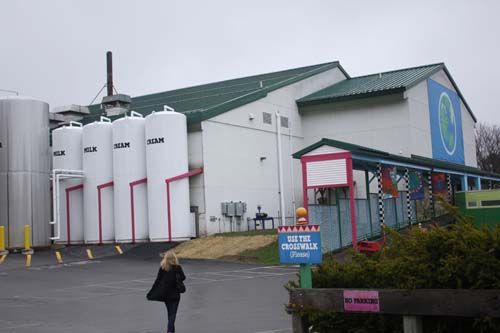
By 1984, Ben and Jerry had grown so successful that Haagen-Dazs actually tried to limit distribution of their ice cream. This prompted Jerry to start the first "What's the Dough Boy Afraid of?" campaign. A lawsuit was filed against Haagen-Dazs' then-parent company of Pillsbury. (Pillsbury -- and by proxy, Haagen-Dazs -- was bought out by General Mills in 2001). There also would be a second suit in 1987. Pillsbury lost both.
The company continued to grow over the years, adding ever more scoop shops and a wider distribution. People who had a clearer business sense than Ben & Jerry were brought in to help keep things soaring. No matter how big they got, both Ben and Jerry made a point of making sure their company was always on the front lines of social responsibility. They were "green" long before even Al Gore was pushing it. (In fairness to Al, though, inventing the Internet must have taken all of the waking time he had.) They worked with local suppliers to keep the products as fresh and pure as possible -- yes, they could have used dairy products with rBGH, and it would have saved money -- but that was not the Ben & Jerry's way.
In 1985, the Ben & Jerry's Foundation was formed. The foundation still exists, and uses portions of the companies pre-tax profits to fund community-based projects.
1988 is an important year in Ben & Jerry's history. That was the year they first started working with the Greyston Bakery (if you have had a Ben & Jerry's flavor with brownies in it, you have had Greyston's Brownies) Not surprisingly, the Greyston Bakery's social mission lines up pretty well with Ben & Jerry's. Greyston has an open hiring policy, and regardless of a person's past history, is willing to give a chance to anyone who may be otherwise considered hard to employ. They also have a foundation of their own that goes to things such as low income housing, day care, medical treatment. and other endeavors that benefit the community (are you noticing a trend here?).
1988 was also the year that Ben and Jerry were named Small Business Persons of the Year -- a title awarded by every hippie's favorite President: Ronald Reagan. (I can only imagine what the duo must have thought about that.)
The Nineties brought even more growth and success, although Ben formally resigned as CEO in 1995. Jerry himself had sort of come and gone through parts of the early '80's, although he did assume the formal title/position of Director of Mobile Promotions in 1987.
So the question remains: How did a company with the slogan of "Peace, Love and Ice Cream," and that operated on the credo "if it's not fun why do it?" -- with founders that are still talked about fondly, if not like family, by long time employees -- end up working for The Man? One thing you notice very quickly is that the vast majority of employees in both the Waterbury factory and the corporate office have been there forever. In this day and age, that's a kind of loyalty that is getting less and less common. I think it certainly has a little something to do with the perks that come with the job -- but it's more than just that. Even now, being part of Unilever, there is a sense that each employee is more than just another fudge chunk in the enormous pint that comprises Ben & Jerry's. These people are living, breathing examples of the principles that Ben & Jerry started the company with. They have gotten recycling down to an art form; doing work with one's favorite local charity/cause is not only encouraged but the company actually pays them for it -- every employee is given five paid days off to use to do good.
There are also frequent company-wide projects that everyone pitches into. They care about the company because in many ways they are the company. Now, don't get me wrong: I am sure there are days when they go home dreading ever seeing a scoop of ice cream again, or when the thought of actually having to go to work just comes in second to having a root canal. But I have a feeling they feel this way a lot less than most of us do.
(Side note: Dear employers of mine who may be reading this: I, of course, never feel this way, and I practically sprint out the door skipping on my way to work. I would never prefer dental work over a day at my jobs! That sounded totally believable, right?)Having the company allowed Ben & Jerry to pursue their passions, to bring help to people, and to bring awareness to areas that at the time were not getting a lot of attention. Their working with smaller local farms and suppliers meant jobs for people that otherwise might never have had them. Even their own factories, office, etc., made them one of Vermont's largest employers. (Still not the biggest, though -- that title is currently held by IBM, if several different Google sources are correct.) And if nothing else, even if at the end of the day it came down strictly to the product they made, they made ice cream, and damned if ice cream isn't pure concentrated frozen happiness. Why did they give that up to a mega-corporation that, to be brutally honest, is not exactly known for being the warmest or fuzziest around? (And that could be a whole other set of posts, so we are not going to get started on that here.). So here we are the late 1990's, and Unilever is basically tossing around huge wads of cash...
This question brings two possible answers immediately to mind -- but are they the right answers? Let's see:
Answer 1:
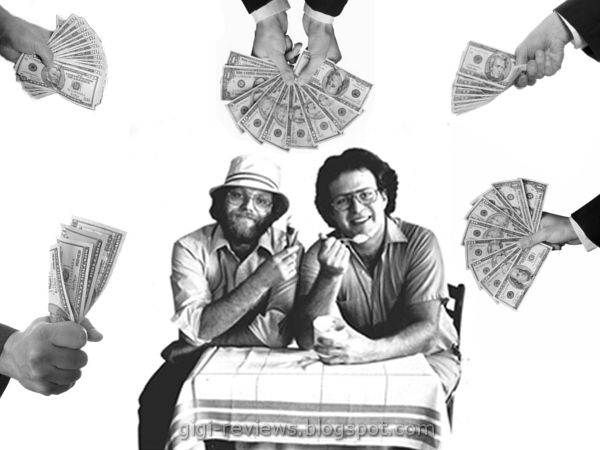
Unilever is tossing around the Benjamins like cheap ho's in a bad rap video. Being tree hugging, free loving, VW bus driving hippies who also happens to run a major ice cream company is great and all...but like, dude, with that kind of money you could afford to have your own patchouli-scented Scrooge McDuck style money pool installed in your house...
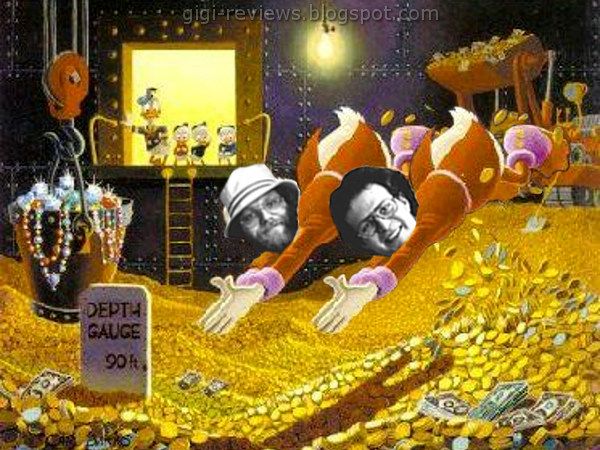
So, did they really sell out for Scrooge pools of their own?
-OR-
Answer 2:
Was the business floundering by that time, and did Unilever tie Ben and Jerry to the tracks like damsels in distress, promising to save them only if they handed over the company?
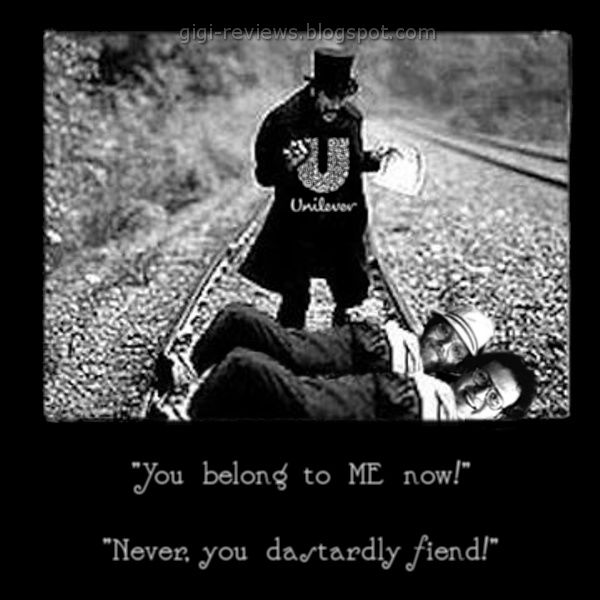
Considering that by 1999 the company had long had an international presence, and had grown from one factory in Waterbury, Vermont, to two additional Vermont factories as well as licensed facilities in both Canada and Israel. And net sales had increased 13.3% over 1998 sales to reach $237 million. And on top of all that, by 1998 they had felt so comfortable with what they were doing on their own that they were actually manufacturing Paul Newman's short-lived line of Newman's Own Organic Ice Cream (which died right around 2000). Thus, I think it's safe to say they didn't need anyone's help to pull them off the tracks.
So neither of those answers are really right. Basically, it comes down to the fact that Unilever made an offer the Board of Directors couldn't refuse.
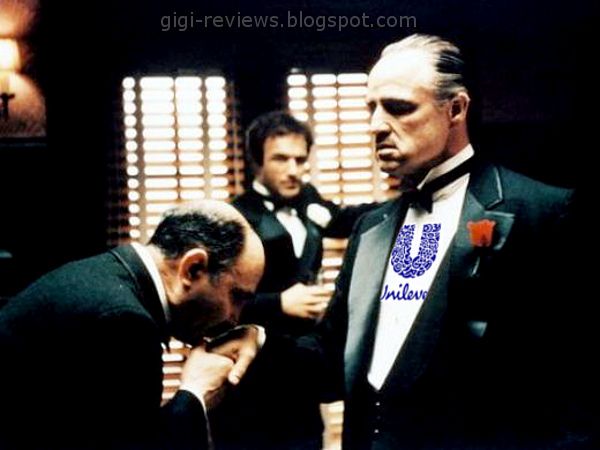
Remember that Ben and Jerry had been selling stock since the early 1980's -- and as with most large businesses, there was now a Board of Directors to contend with. In the span of the late 1990's, several offers were made for the company by Dreyer's/Edy's (I can't say I am sorry that one fell through -- we probably would have had Ben & Jerry's "Fun Flavors" by now), and even by Haagen-Dazs. But Unilever, much like that bad date that just won't stop texting, kept in hot pursuit. Ben and Jerry did not want to sell to them; although it seems from all accounts that the Board was leaning that way. Ben, in an effort to save the company, had even proposed an offer that would cut Unilever in but leave himself and an investor group that he, Jerry, and others were part of in control, but at the same time would still keep the company privately held. Unfortunately, unlike the offers such as those made by Dreyer's (which would have basically meant that stock from the "old" company and stock from the "new" company would have swapped at the same share price), Ben's offer -- through business laws/rules/whatever that I don't entirely know how to explain -- would have caused the capital gains tax to kick in (i.e., massive money lost to the federal government) and no one wanted that. Unilever apparently saw this as an opportunity to weasel in as if Ben & Jerry's were that chick at the bar who just got rejected by the guy she really liked, and they were the guy she was trying to ignore. In the end, after offering her a drink worth $326 million, the company's proverbial panties hit the floor.
The Board overruled Ben and Jerry, accepted Unilever's offer, and the deal was closed on April 12th of 2000. (Ironically enough, Unilever also bought the Slim Fast brand on the same day). Unilever actually did call the next day and probably even sent flowers.
After the buyout, both Ben and Jerry relinquished any board or managerial roles they may have kept up until that point. But they still remain active with the company, even without any official positions or responsibilities. In a sense, they have became more like iconic figureheads to the company they gave life to. They also remain active with the company's causes, and they sometimes appear at special functions for the company or its charity causes, etc. And after 47 years, they are still friends.
As for the actual company and Unilever: Steps were taken during the merger to ensure that Ben & Jerry's vision and operating procedures would stay as intact as possible. I couldn't possibly do it justice to try to explain (again, that sugar high kicked in 'round about the time these topics came up), but the impression that I got is that while Ben & Jerry's is part of the massive Unilever empire, it still runs almost entirely independent from them. Essentially, you could think of it like this: Ben and Jerry's is that kid who has gone off to college, Unilever might be its parent (and paying most of its bills), but ultimately Ben & Jerry are doing what they want to. Unilever might be hovering in the background and sending care packages, but magically Ben & Jerry's cell phone gets really crappy reception when they call to check up on it. I am sure it is vastly more complicated than that, and not nearly as idealistic as I may have made it sound -- but let's remember this is still a food blog, and I am not going for an MBA here.
And that, my friends, in a not-so-short nutshell, is how Ben and Jerry's ended up working for The Man.
And speaking of The Man, tomorrow we wrap up my trip with our last day...which includes meeting Jerry!

Haha I love the godfather/Unilever pic :D
ReplyDeleteI am glad to see that the Unilever takeover didn't take away the core principles of Ben & Jerry's.
Lets hope this continues long into the future, for many more crazy cat flavours.
Great posts Gi! I have loved reading every single one of them
JIM